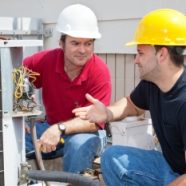Keep Vital Machinery Running for Optimum Production
What constitutes vital machinery in your business will be different from anyone else’s, but it generally falls under at least one of two rules. Losing it makes running your business difficult or impossible, and losing it can create a significant financial loss. Depending on your industry, your vital machinery may be:
- Walk-in refrigerators and freezers in a restaurant
- POS registers in a store
- Medical equipment in a nursing home, clinic or hospital setting
- Computers in an office
- Espresso machines in a coffee shop
What constitutes a vital piece of electrical equipment in one setting can be a luxury in another, and only you know what’s on your list. The important thing is to keep your vital machinery running, with no shutdowns for emergencies. The more types of electrical protection you have, the better the odds that you can keep your business open.
Possible Electrical Problems
Power outages are a larger problem here in south Florida than in many other regions of the country. Our weather is a big contributor to loss of power, causing thousands of micro-outages each year. Every time your power blinks, there’s the possibility of damage being done. Storms aren’t the only reason for the power to go out. Damage from traffic accidents or construction site mishaps can cut power for a long time, while older city wiring can tire out before being replaced.
Even if the power is steadily feeding into your building, you can still have a problem with your supply. Every building is wired based on its average expected use. The wiring in your building is rated for what’s expected on an average day. If your power usage increases dramatically for any reason, it can overload the system. Your circuit breaker will shut down the power to the part of the building that’s overloading it.
Forms of Electrical Protection
The most common reason for vital machinery going down is loss of electrical power. In south Florida we’re subject to more lightning strikes than any other state in the country, plus problems with tropical storms, hurricanes and an aging infrastructure. All this adds up to thousands of commercial electrical south Florida business owners with blackouts that may happen at any time.
The problem here isn’t usually the loss of power; most power outages last only seconds. The trouble happens when the power suddenly comes back on, surging through the system. This power surge can burn out computers and fry circuits in any number of crucial machines in your place of business. Your best protection against this is to have your electrician install surge control devices in your building. A surge controller is a buffer against a sudden sharp spike in electrical power, allowing the machinery to turn back on without the damaging effects of the spike. Some surge protectors even have short-term power supplies, allowing your machines to stay on for five to thirty minutes. This gives you enough time to turn your machinery off, eliminating the danger from power surges.
Even if the city power stays on, you can still have a problem by overloading the system. If your vital machinery is located in one central area of the building, such as a group of computers in one office, it’s smart to have your electrician install a dedicated circuit to that one area of your business. Having important machinery on a separate and dedicated circuit means it won’t be affected if a breaker goes off in a different part of the building. It’s another layer of protection, designed to wall off the most crucial machinery from lesser machines such as coffee makers and lamps.
Maintenance Agreements Can Make All the Difference
The smartest form of electrical protection is setting up a maintenance agreement with your electrical contractor. Every piece of electrical equipment, from your circuit breakers to intricate medical machinery, has maintenance needs and schedules. Following those schedules will reduce or eliminate emergency repair calls due to key machinery breaking down. If a machine is in poor repair, it’s more likely to suffer major damage if it goes through a power spike or outage. Your licensed electrician will replace frequently-worn parts before they need changing, as well as inspecting your equipment to look for potential problems that can come up in the future. Prevention is always smarter than repair, and it’s generally much more cost-effective for your business, too.
Read MoreHow Does Electrical Estimating Work?
Commercial electrical can be a complex process. Contractors often work with a variety of construction professionals like architects and engineers, larger general contractors, their direct clients, and many other people to complete new construction projects, or on maintenance projects that include electrical service contracts.
Unlike residential electrical in South Florida, which is usually a straightforward process that mainly revolves around getting a few quotes and choosing the contractor that offers the best deal, commercial electrical usually includes a bidding process. A big part of that bidding process is electrical estimating, and we thought we’d share a little more about how the electrical estimating process works, so that you have a little more insight into what we do.
Invitation to Bid
The electrical estimating process starts with an invitation to bid, or with an open bid invitation. When we are specifically invited to provide a bid on a project, it’s usually by a general contractor or a construction professional (like an architect) who we have worked for before. Sometimes, projects are advertised for open bid, which means that any contractor who meets the minimum criteria for the bid can provide pricing.
Specifications and Scope of Work
Once we’ve decided to provide a bid on a commercial electrical project, the next step is to establish what the scope of work and specification is. If there is a formal bid document, that will usually provide most of the information, but this step of the process may also involve contacting our client to ask for information, attending formal site meetings, reviewing drawings and more. The more information we have about a commercial electrical project, the more accurate our estimates can be.
Sourcing Products and Estimating
As an established electrical contractor, we have established relationships with suppliers, and our electrical estimating system already has most of the common parts, consumables, wires and cables and other elements included in it, but every once in a while, we need to find something specific, and this usually happens early on in the estimating process.
Once we’re sure that we have all the product information and pricing on hand, the next step is to do a detailed take off of materials and a labor estimate, and to compile everything into a detailed bid and proposal.
After We Quote
After we quote on commercial electrical projects, there may still be work to be done. Sometimes, our clients decide to make changes to the specifications and scope of work, sometimes they request alternatives. The process can take some time, and we usually expect to answer at least a few questions along the way.
After the Job Starts
Very often, the estimating process doesn’t end on commercial electrical projects just because the job has started. Just like we sometimes discover surprises on residential electrical projects in South Florida (particularly renovations and retrofits), there are sometimes surprises on our commercial installations and electrical service contracts too.
When those issues arise, our project management and estimating teams will usually work with the client to come up with the best, most cost effective solution to the problem.
As you can see, however, estimating for commercial electrical is a long and ongoing process. If you do have a commercial project, and you’d like to know more, be sure to contact our team. We’re always happy to help with advice, budget pricing and insight.
Read More4 Real World Electrical Disaster Stories
When you work in commercial electrical, and you pride yourself on attention to detail, quality installations and top notch electrical maintenance, you usually don’t want to think about electrical disaster stories. However, every once in awhile, it helps to look at real world examples of what can happen when you don’t do the right thing, or when you fail to take steps to ensure electrical protection. So here are a few electrical disaster stories that should give you food for thought!
1. Thomas Edison Sets Vanderbilt Parlor Alight, 1879
We might remember him as one of the greatest inventors who ever lived, but that doesn’t mean Thomas Edison didn’t make mistakes along the way. In 1879, he was asked to provide electric lighting in the Vanderbilt parlor. Since William Henry Vanderbilt was a wealthy benefactor, Edison obliged, but a wiring error lead to electricity being discharged into the wallpaper, which contained a conductive metal thread. The result was a fire that virtually destroyed the parlor!
2. Iroquois Theatre Fire, Chicago, December 30, 1903
Not long after electricity became a common fixture in buildings in the U.S., a stage light in the back of the theater overheated, ignited a velvet curtain, and started a fire that would eventually kill 602 people, making it the deadliest single building fire in U.S. history.
The accident can be attributed to poor fire safety, early lighting that overheated quickly, and the lack of emergency lighting to light the way out for victims.
3. New London School Explosion, Texas, March 18, 1937
The New London School Explosion was caused by a natural gas leak. More precisely, it was caused by a gas leak that came into contact with a bad electrical connection, causing the gas to ignite, and causing the structure to collapse. The estimated fatality count ranges from 296 to 319, depending on which source you consider more accurate.
Explosions like these lead to changes in how natural gas is supplied and used, but also highlighted the importance of safe, spark free electrical in homes that do use gas for heating and other purposes.
4. MGM Grand Hotel Fire, Las Vegas, November 21, 1980
Proof that electrical disasters weren’t relegated to the early days of electrified buildings, the MGM Grand Hotel in 1980 was caught in a conflagration that started with an electrical fire, was fed by PVC pipes and other synthetic materials, tore through 26 floors, killed 87 and injured more than 700. This accident was proof that even on large, high profile buildings, mistakes with electrical systems could be catastrophic.
Learn from the Past
One of the most important things disasters like these, and others, have taught us is that while electricity can power our lives, and is a critical part of civilization, it’s also very dangerous, with the potential to do severe damage.
It is absolutely critical that we learn from the mistakes of the past, and design electrical systems and installations for the future with better electrical protection methods in place, to ensure that residential and commercial electrical is safer for everyone.
Read MoreElectrical Faults: Are There Clues in Your Utility Bills?
If you’ve ever received a utility bill that is much higher than normal, then you’ve probably had the same reaction everyone does. Chest pains, followed by an angry call to the electric company to tell them they’ve made a mistake. Often, it is an administrative error that sends your residential or commercial electrical bills skyrocketing, but sometimes, the cause is inside your home, and not with city administrators. Here’s what you know about how high electrical bills can be a clue that there’s something wrong with your wiring or that you need electrical protection.
Faulty Meter
The first, and most obvious electrical problem that may be causing spikes in your utility bills is that there is a faulty meter. If there is a problem with your electric meter, it may continue running even when everything in your home is switched off.
Most people don’t give their meter a second thought until they get a very high bill, but there are ways to check if it’s working properly. If you switch off every breaker in your home, and the meter is still turning, then that’s a clear sign that all is not well! If you do suspect that your meter is faulty, contact the electric company as soon as possible, as it will need to be repaired or replaced.
Faulty Water Heater
Another major cause of high power bills is a water heater that is not working properly. Sediment in a hot water heater tank, or build up on the element can mean that the unit has to work a lot harder to heat the water for your home, and those costs can add up quickly.
If it’s been awhile since you’ve replaced your hot water heater, or you’ve never had it replaced or checked, then this is definitely something you will want to investigate.
Faulty HVAC
Your air conditioner is another piece of equipment you will want to have checked if you have a much higher than normal power bill. Even a small refrigerant leak can cause your air conditioner to work much harder than usual, and that can cause a huge spike in your power bill. Worse still, since there won’t be a noticeable change in the noise or operation of the A/C unit, most people will have no idea until they get their power bill!
Shorts and Other Electrical Issues
Sometimes, spikes in power usage are due to short circuits, or power leaks. Sometimes, people find that there’s a concealed extension cord running from their garage to an alley or a neighbor, and someone is actually stealing power. In the case of the latter, you should call the cops, but in the case of the former, you definitely want an electrical contractor to take a look.
Short circuits or faulty wiring can be dangerous as well as costly, and if the power is leaking onto a conductor, they could have lethal consequences. If there is any concern, it’s always best to hire a professional to trace the problem, and offer solutions for electrical protection, and to ensure that your home is safe for everyone who lives there.
Never Ignore the Signs
A very high power bill is almost always a sign that something is amiss, unless you’ve had guests staying or started working on a major project in your garage, and you know why you’ve had a usage spike. If you’re not sure, call an electrician in South Florida, and get to the bottom of the problem. It’s the best solution all round.
Read MoreElectrical Honey-Dos: When Should You Call an Electrical Contractor?
Most people have a level of comfort when it comes to small electrical repairs. Changing the light in a stove or fridge, switching out a light fixture, and other minor tasks may all fall into the realm of things that your “honey” can do for you, but there are times when you need professional help. Here are a few instances where you should not attempt to do repairs yourself.
1. When There Is Visible Damage
When you can see visible damage to wiring, when an outlet has a scorch mark or when something has melted, it’s a sign that all is not well with your electrical, and that can be dangerous (or deadly) to people who aren’t qualified electricians. If you see this sort of damage, then this is not an electrical DIY project. Call the professionals, sooner rather than later.
2. When There’s Water Damage
When your electrical problems are also water problems, then you definitely need to call in the professionals – electrical and otherwise. Water and electricity are a dangerous combination, and not one that you want to mess with.
3. When You Need Changes Made
Adding an outlet. Expanding a panel. Changing the wiring in part of your home, or adding more wiring for an addition. These are all things that you need the expertise of a professional to do correctly and safely, and are not tasks that you want to undertake as DIY residential electrical in South Florida.
4. When There Are Shorts or Sparks
If you’re having trouble with your panel, and you regularly have circuit breakers tripping, that is a clear sign of serious electrical problems somewhere in your home. Likewise, if you see sparks anywhere in your home electrical, then you almost certainly have a problem that needs professional attention.
5. When You Live in an Old Home
Older homes often have complicated, outdated or just plain weird electrical. If your home is older, then there’s a good chance that you could have knob and tube wiring, asbestos in your walls or other hidden dangers to contend with, you might not even recognize some of the things on the board, and there may be fire hazards hidden in your walls. If you start having electrical problems in an older home, chances are you’re going to need professional help.
6. When You’re Doing a Major Appliance Upgrade
If you’re remodeling your kitchen, and you’re going from modest, old style appliances to power hungry commercial grade ones, or you want to turn a room into a home theater, then you probably need professional help. Major changes to your power consumption can overload your panel, and if you’re planning anything big, it’s best to get the all clear first.
This list is not complete, and there are probably many other times when you would need electrical protection in West Palm Beach. If you’re in any way unsure or uneasy about any electrical DIY, minor or major, contact an electrical contracting company. They’ll be able to tell you if it’s something that a handy homeowner can handle, or whether you need a little more skill (or a permit!)
Read MoreWhat’s Covered in a Commercial Electrical Maintenance Agreement
Commercial electrical maintenance is a critical element in maintaining the health and safety of a workplace, ensuring that your business insurance policy covers you in the event of a malfunction, and for ensuring that your commercial power stays stable and operational when you need it. However, even if you are looking for a contractor to enter into an electrical service contract, you might not be sure exactly what you can expect.
While these types of electrical maintenance contracts can vary greatly from one contractor to the next, there are a few things that most good commercial electrical maintenance agreements will cover. This is what you should look for:
Read More






Recent Comments